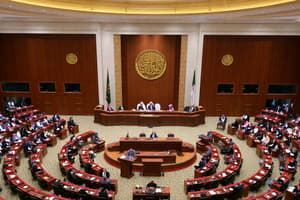Podcast
Questions and Answers
What was the title given to the ruler of the First Saudi Government before it expanded?
What was the title given to the ruler of the First Saudi Government before it expanded?
- Amir (correct)
- Sultan
- Khalifah
- Sharif
The First Saudi Government was established without the influence of Sh. Muhammad Abdul-Wahhab.
The First Saudi Government was established without the influence of Sh. Muhammad Abdul-Wahhab.
False (B)
Who stepped down from his position after the Riyadh Conquest in 1187 H?
Who stepped down from his position after the Riyadh Conquest in 1187 H?
Sh. Muhammad Abdul-Wahhab
The First Saudi Government was based on the Oneness of Allah (________) and Shari’a Implementation.
The First Saudi Government was based on the Oneness of Allah (________) and Shari’a Implementation.
What was one of the major sources of income for the First Saudi Government?
What was one of the major sources of income for the First Saudi Government?
Match the following commanders with their respective regions:
Match the following commanders with their respective regions:
The economic system of the First Saudi Government was significantly different from those adopted by early Islamic governments.
The economic system of the First Saudi Government was significantly different from those adopted by early Islamic governments.
What role did a governor play in the First Saudi Government?
What role did a governor play in the First Saudi Government?
Who was the ruler of Kharj?
Who was the ruler of Kharj?
Regular soldiers were recruited as part of the First Saudi Government's army.
Regular soldiers were recruited as part of the First Saudi Government's army.
The education activities during the First Saudi Government focused mainly on __________ knowledge.
The education activities during the First Saudi Government focused mainly on __________ knowledge.
What principle was the military leadership of the First Saudi Government based on?
What principle was the military leadership of the First Saudi Government based on?
Who assumed responsibility for overseeing financial issues as the state expanded?
Who assumed responsibility for overseeing financial issues as the state expanded?
Match the following scholars with their relationship to Sheikh Muhammad Abdul-Wahhab:
Match the following scholars with their relationship to Sheikh Muhammad Abdul-Wahhab:
Tawheed was one of the least emphasized areas of study during the First Saudi Government.
Tawheed was one of the least emphasized areas of study during the First Saudi Government.
Name one of the major expenses of the First Saudi Government.
Name one of the major expenses of the First Saudi Government.
Flashcards
First Saudi Government Governance
First Saudi Government Governance
Based on the Oneness of God (Tawheed) and Sharia law, with close cooperation between the Al-Saud rulers and Sh. Muhammad Abdul-Wahhab.
Amir/Imam Title
Amir/Imam Title
The title of a ruler in the First Saudi Government. 'Amir' was used initially; the title evolved to 'Imam' as the state expanded.
Crown Prince Role
Crown Prince Role
Reserved for the eldest son during the father's reign. The crown prince commanded the army in the father's stead.
District Governors
District Governors
Signup and view all the flashcards
First Saudi Military
First Saudi Military
Signup and view all the flashcards
Military Leadership Structure
Military Leadership Structure
Signup and view all the flashcards
Recruitment Methods
Recruitment Methods
Signup and view all the flashcards
Famous Military Commanders
Famous Military Commanders
Signup and view all the flashcards
First Saudi Government Economy
First Saudi Government Economy
Signup and view all the flashcards
Zakat
Zakat
Signup and view all the flashcards
Government Expenses (First Saudi)
Government Expenses (First Saudi)
Signup and view all the flashcards
Early Saudi Financial Management
Early Saudi Financial Management
Signup and view all the flashcards
First Saudi Education Focus
First Saudi Education Focus
Signup and view all the flashcards
First Saudi Scholars
First Saudi Scholars
Signup and view all the flashcards
Important Islamic Concepts - Education
Important Islamic Concepts - Education
Signup and view all the flashcards
Limitations of Educational Development
Limitations of Educational Development
Signup and view all the flashcards
Study Notes
Governance
- The First Saudi Government was based on the Oneness of Allah (Tawheed) and Shari'a implementation.
- The government functioned through close cooperation between the Al-Saud rulers and Sh. Muhammad Abdul-Wahhab.
- After the conquest of Riyadh in 1187 H, Sh. Muhammad stepped down from his financial ministry position, replaced by Imam Abdul-Aziz Bin Muhammad.
- The Sheikh remained the leading advisor on essential state matters.
- A leader of the First Saudi Government was titled "Amir," later "Imam" as the territory expanded.
- The crown prince was the eldest son during his father's reign.
- Army leadership was given to the crown prince.
- Governors were appointed to each district.
- Their responsibilities included implementing Sharia, collecting Zakah, preparing for military defense, and potentially invading neighboring regions.
- The governor was considered the General Army Staff Commander of the state.
Military Leadership
- The First Saudi Government was founded on the principles of Jihad to spread the Da'wa (Islamic call).
- Conflicts occurred for the purpose of spreading Islamic beliefs and defending the state.
- Regular soldiers were not recruited, only special guards for the Amir.
- District governors and tribal chiefs were responsible for recruiting fighters.
- Other fighters joined voluntarily for Jihad blessings or war spoils.
- The Amir led the army, or assigned his sons or prominent figures of districts to command.
Military Commanders
- Hijaylan Bin Hamad, ruler of Qasim.
- Abdul-Wahhab Abu Nuqtah, ruler of Aseer.
- Suleiman Bin Ifaysan, ruler of Kharj.
- Othman Al-Madhayfi, Chief of Adwan tribe.
- Mutlaq Matayri, ruler of Baraymi.
Economy Affairs
- The First Saudi government's economic system mirrored early Islamic governments.
- Major sources of income included Zakah and war loot.
- Main expenses went towards state activities, salaries, judges, Zakah collectors, teacher/disciple support, and disaster relief.
- In the reign of Imam Saud Bin Abdul-Aziz, income usually exceeded expenses.
- Sheikh Muhammad initially oversaw financial matters.
- Amir Abdul-Aziz Bin Muhammad later handled financial issues as the state grew.
- The Amir of the government assumed responsibility for finances at the end.
Education and Scholars
- The First Saudi government invested in education and stressed Islamic knowledge (Tawheed, Tafseer, Hadeth, Fiqh, Sira).
- Tawheed (Islamic monotheism) was the primary focus in education.
- Scholars taught Arabic well.
- Although the Arabic language and writing was developed, there wasn't a commensurate development of art.
- Notable disciples of Sheikh Muhammad Abdul-Wahhab also became recognized scholars.
- Some of these scholars were Abdul-Allah Bin Sheikh, Hussein Bin Sheikh, Suleiman Bin Abdul-Allah, Abdul-Aziz Bin Hussein, Abdul-Rahman Bin Nami and Hamad Bin Maemar.
Studying That Suits You
Use AI to generate personalized quizzes and flashcards to suit your learning preferences.




